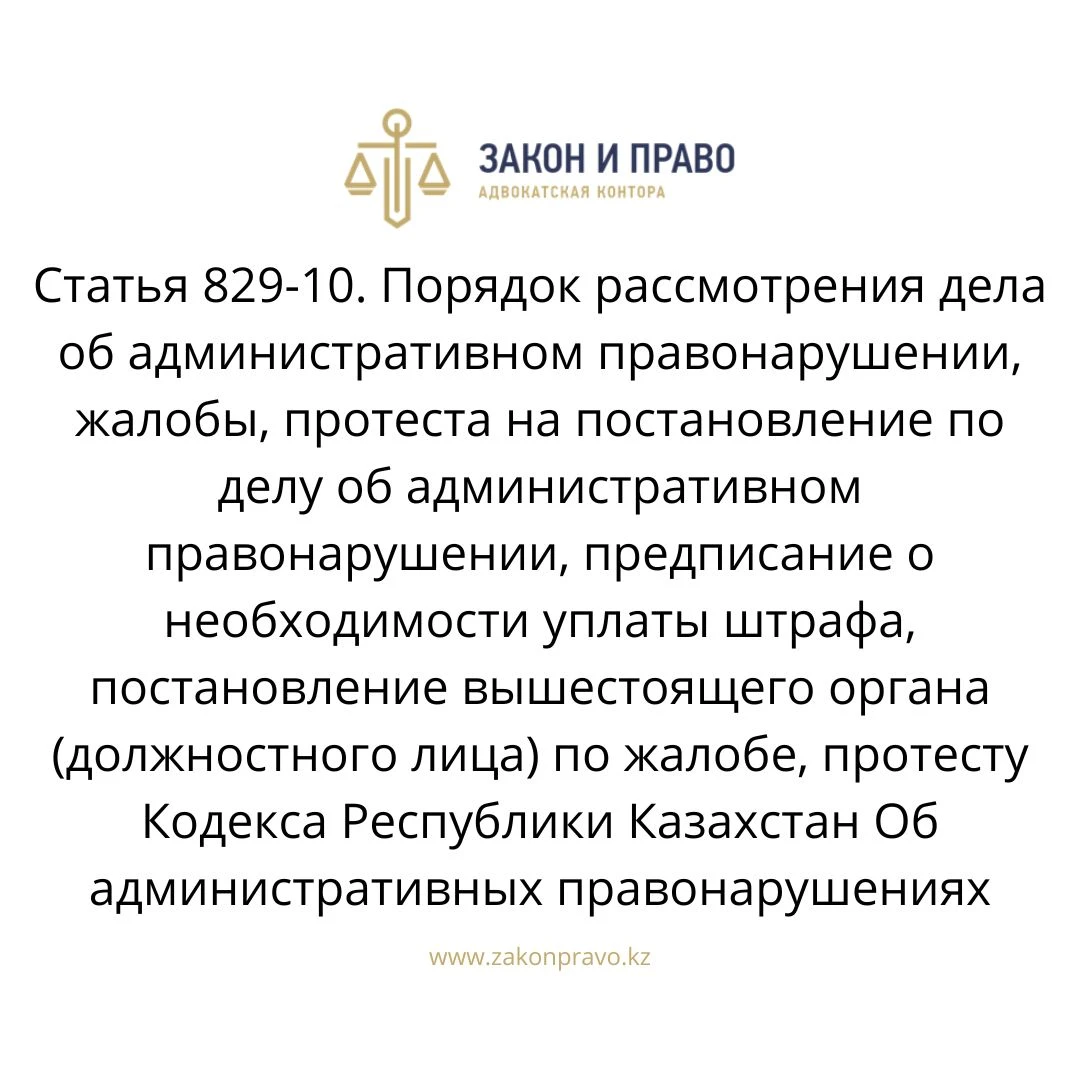Article 829-10. The procedure for considering an administrative offense case, complaint, protest against a decision on an administrative offense case, an order on the need to pay a fine, a decision of a higher authority (official) on the complaint, protest of the Code of the Republic of Kazakhstan on Administrative Offenses
1. The court, having begun consideration of the case, complaint, protest:
1) announces who is considering the case, which case, complaint, protest are subject to consideration, who is being held accountable and on the basis of which article of this Code, determines the language of the proceedings;
2) certifies the appearance of the person being held administratively liable or his representative, as well as other persons participating in the consideration of the case, complaint, protest;
3) establishes the identity of the participants in the proceedings and verifies the powers of the legal representatives of the persons, the defender;
4) finds out the reasons for the non-appearance of the participants in the proceedings and decides on the consideration of the case, complaint, protest in the absence of the specified persons or on the postponement of the consideration of the case, complaint, protest;
5) if necessary, issues a ruling on the summoning of a person whose participation is mandatory during the consideration of a case, complaint, protest, appoints an interpreter;
6) explains to the persons participating in the consideration of the case their rights and obligations provided for by this Code, including the right to receive free legal aid at the expense of the state budget;
7) resolves the filed challenges and petitions;
8) announces the protocol on the administrative offense, the complaint, the protest, and, if necessary, other case materials.;
9) hears the explanations of the person in respect of whom the proceedings are being conducted, the testimony of other persons participating in the proceedings, the explanations of the specialist and the expert's opinion, examines other evidence, and in the case of the prosecutor's participation in the consideration of the case, complaint, protest hears his conclusion.;
10) issues a ruling on the postponement of consideration of a case, complaint, protest in connection with: an application for self-recusal or recusal of a judge, if his recusal interferes with the consideration of the case, complaint, protest on its merits; with the recusal of a defender, an authorized representative, an expert or an interpreter, if the said recusal interferes with the consideration of the case, complaint, protest essentially; with the need for the appearance of persons participating in the consideration of the case, complaint, protest, or the request for additional materials on the case, complaint, protest, as well as in the cases provided for in the second part of Article 51 of this Code. If necessary, the court issues a ruling on the appointment of an expert examination.;
11) issues a ruling on the extension or suspension of the time limits for consideration of a case, complaint, protest;
12) issues a ruling on the transfer of the case for consideration on the merits in the cases provided for in Articles 829-9 of this Code.
2. When considering a case, complaint, or protest, the legality and validity of the initiation of an administrative offense case, the decisions made on the materials available in the case, and the additional materials submitted, are checked, and a decision is made on the arguments of the complaint filed in accordance with the second paragraph of the first part of Article 829 of this Code.
The court is not connected with the arguments and circumstances of the case, complaint, protest and verifies the case in full, while it has the right to establish new facts and examine new evidence.
When considering a case, complaint, or protest, the court may change the legal qualification of the act only within the limits of the article or part of the article of the Special Part of Section 2 of this Code, for which administrative proceedings have been initiated. A change in the qualification of an act is allowed only if the situation of the person brought to administrative responsibility improves.
3. The court has the right to postpone consideration of the case, complaint, protest in connection with the non-appearance of the summoned persons, the request for additional materials on the case, the appointment of an expert examination and in other cases when it is necessary for a full, comprehensive and objective consideration of the case, complaint, protest.
4. The court, having established the fact of disrespect for the court on the part of a person present in the process directly during the trial, has the right, by announcing the fact, without complying with the requirements of subparagraphs 2), 4), 8) and 12) of the first part of this Article, to order the imposition of an administrative penalty on the guilty person provided for in Article 653. of this Code.
5. The case of the fact of contempt of court by a person present in the process, established during the trial, is considered by the judge (court) directly at the same court session with the establishment and recording of this fact in the minutes of the court session.
6. If an official who initiated an administrative offense case or a representative of a government agency whose representatives have the right to initiate cases of administrative offenses participates in the consideration of a case, complaint, or protest, they are the first to provide explanations on the merits of the offense and evidence of a person's guilt in its commission.
7. If necessary, other procedural actions provided for by this Code are carried out.
President
Republic of Kazakhstan
© 2012. RSE na PHB "Institute of Legislation and Legal Information of the Republic of Kazakhstan" of the Ministry of Justice of the Republic of Kazakhstan
Constitution Law Code Standard Decree Order Decision Resolution Lawyer Almaty Lawyer Legal service Legal advice Civil Criminal Administrative cases Disputes Defense Arbitration Law Company Kazakhstan Law Firm Court Cases


